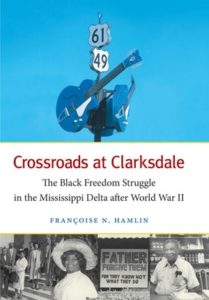 The Black Freedom Struggle in the Mississippi Delta after World War II
The Black Freedom Struggle in the Mississippi Delta after World War II
In Crossroads at Clarksdale, Françoise Hamlin chronicles the slow struggle for black freedom through the history of Clarksdale, Mississippi by using the stories of the daily lives and familiar places of local residents. Hamlin creates a full picture of the town spanning over a period of fifty years, recognizing the accomplishments of its diverse African American community and strong NAACP branch, and examining the extreme brutality of entrenched power there. But Clarksdale is not a triumphant narrative of dramatic change; instead, it embodies a layered, contentious, untidy, and often disappointingly unresolved part of the civil rights movement.
Following the black freedom struggle in Clarksdale from World War II through the first decade of the twenty-first century allows Hamlin to tell multiple, interwoven stories about the town’s people, their choices, and the extent of political change. She shows how members of civil rights organizations worked to challenge Jim Crow through fights against inequality, police brutality, segregation, and, later, economic injustice. With Clarksdale still at a crossroads today, Hamlin explores how to evaluate success when poverty and inequality persist.
Reviews and endorsements of the publication include:
“A beautifully written book, strong in its ability to capture the different organizing strategies pursued in one community. . . . A major contribution to civil rights historiography.”—Journal of American History
“Adds much to the story of civil rights in Clarksdale and beyond . . . [and] provides an incredibly rich account of race, class, gender, generational, and organizational tensions within the civil rights movement.”—Journal of Southern History
“[This book] is a much-needed additive to the already-extant literature on the Mississippi civil rights movement, not only for its artful prose, but also because it sets a high standard for future researchers, pushing scholars to expand their source base and periodization. Hamlin’s book should be widely read.”—The Historian
For more information on the publication, click here.
Fellow travelers are scholars, activists, and practitioners that embody the ideals and commitments of the Project on Lived Theology. We admire their work and are grateful to be walking alongside them in the development and dissemination of Lived Theology.
